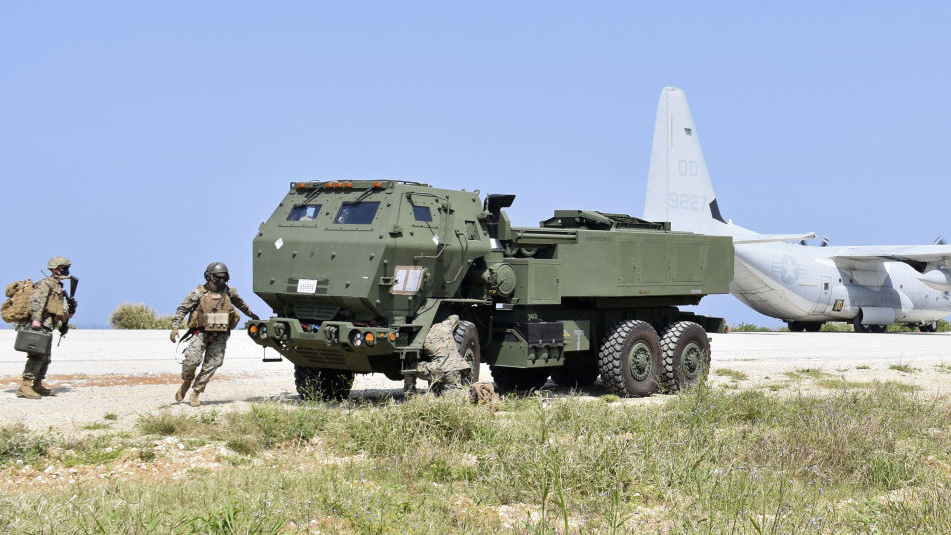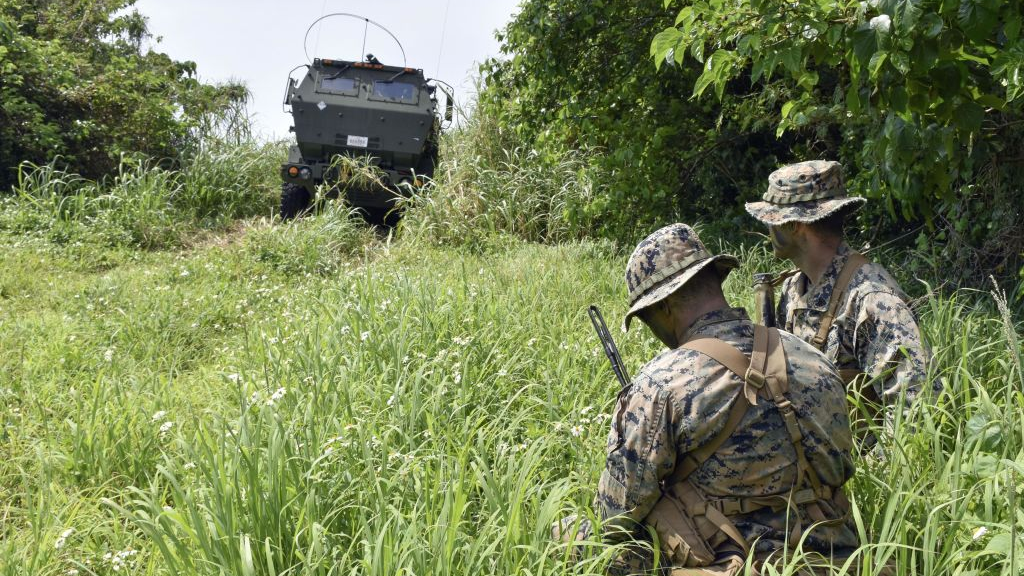
A multiple rocket launcher HIMARS is seen on a U.S. military airfield on Lejima Island in Okinawa Prefecture, southern Japan, March 15, 2021. /Getty
A multiple rocket launcher HIMARS is seen on a U.S. military airfield on Lejima Island in Okinawa Prefecture, southern Japan, March 15, 2021. /Getty
Editor's note: Andrew Korybko is a Moscow-based American political analyst. The article reflects the author's opinions and not necessarily the views of CGTN.
The U.S. is dangerously toying with the idea of provoking an Asian missile race by its reported plans to deploy ground-based intermediate-range missiles to Japan.
Russian Foreign Ministry spokeswoman Maria Zakharova responded to this scenario last Friday by warning that "this would trigger a new spiral of the arms race fraught with unpredictable consequences." She promised that "the emergence of more missile threats will certainly entail our retaliation." The onus for averting an Asian missile race therefore rests on the U.S., which is irresponsibly endangering regional peace and security through its reported plans.
America is aware of the dire consequences that it risks catalyzing but is apparently willing to go through with them anyhow as a result of its obsessive drive to contain China. After all, the former Donald Trump administration claimed that the country couldn't continue abiding by the Intermediate-Range Nuclear Forces (INF) Treaty's regulations so long as China wasn't a party to the pact. It also blamed Russia for violating the agreement's terms, but most observers agreed that this move was much more directed against Beijing than against Moscow. Even so, Russia's security would be threatened if the U.S. deployed intermediate-range missiles to Asia even if it was under the public pretext of containing China.
The Democratic People's Republic of Korea (DPRK) would also understandably be seriously concerned by such destabilizing development as well, fearing that the U.S. might use those weapons against it one day too. In turn, it's predictable that Pyongyang might consider doubling down on its missile programs in order to defend itself from such a plausible scenario, which might then make the stalled denuclearization talks much more difficult. In fact, they might even finally collapse once and for all, which would be detrimental for the Republic of Korea's and Japan's security too.

U.S. military personnel and a multiple rocket launcher HIMARS are seen on a U.S. airfield on Lejima Island in Okinawa Prefecture, southern Japan, March 15, 2021. /Getty
U.S. military personnel and a multiple rocket launcher HIMARS are seen on a U.S. airfield on Lejima Island in Okinawa Prefecture, southern Japan, March 15, 2021. /Getty
Analyzed from a broader perspective, it can be concluded that the U.S.' decision to withdraw from the INF Treaty directly affected the security situation in Northeast Asia in the most adverse way possible. It's triggering a chain reaction of consequences that might only make everything worse, though provided of course that it goes through with its reported plans to deploy such weapons in the region in the first place. This observation speaks to the importance of upholding international arms agreements and the destabilizing consequences whenever one party unilaterally withdraws from them, especially when they do so on invented pretexts.
Missile races were thought to have belonged in the bygone era of the Cold War without any place in the 21st century, but the U.S. is attempting to revive such dynamics due to its mistaken belief that it'll put enough pressure on China that the latter could be successfully contained. This is a very dangerous, irresponsible, and false strategic assessment as was argued above because the eventual consequences – especially related to the DPRK's probably decision to double down on its missile program in response – would also harm the security of U.S. allies like the Republic of Korea (ROK) and Japan, as well as U.S. forces in those countries.
The last thing that the world needs right now as it's supposed to be focusing on containing the COVID-19 pandemic is an Asian missile race comprising the U.S., China, Russia, the DPRK, the ROK and Japan. This scenario must be averted at all costs, but at the same time, all parties must also be prepared for it since only the U.S. can prevent it from happening. Japan and the ROK should consider voicing their concerns about the earlier analyzed regional security consequences with their American ally in order to let the Pentagon know how unacceptable they would be.
There's no doubt that Russia, China, and the DPRK will respond in responsible ways in order to protect their security interests as it's their international right to do so, but it would be better if they weren't forced to do such a thing. It's arguably also in the ROK and Japan's interests not to see the advent of an Asian missile race in their region either, especially since they'd be risking their own security by possible hosting such U.S. weapons in that scenario. In any case, it's ultimately up to the U.S. to decide whether or not such a scenario will transpire, but all peace-loving people across the world will sincerely hope that it does the right thing.
(If you want to contribute and have specific expertise, please contact us at opinions@cgtn.com.)

